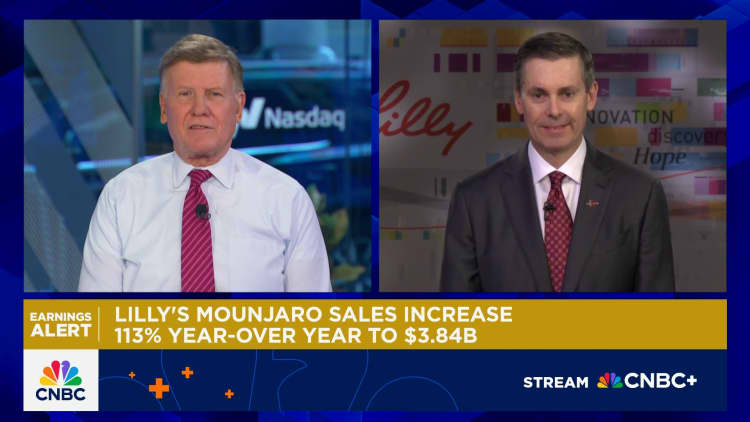Eli Lilly (LLY) earnings Q1 2025


Eli Lilly on Thursday reported first-quarter revenue and earnings that topped estimates as demand for its weight loss and diabetes drugs soared, but lowered its full-year profit guidance due to charges related to a recent cancer treatment deal.
The pharmaceutical giant now expects its adjusted fiscal 2025 earnings to come in between $20.78 and $22.28 per share, down from previous guidance of $22.50 to $24 per share. Eli Lilly said the revision reflects a $1.57 billion deal charge recorded in the first quarter, which is primarily related to its acquisition of a certain oral cancer drug from Scorpion Therapeutics.
The company maintained its fiscal 2025 sales guidance of $58 billion to $61 billion. Eli Lilly said the guidance reflects President Donald Trump‘s existing tariffs as of May 1, but does not include his planned levies on pharmaceuticals imported into the U.S.
In an interview with CNBC, Eli Lilly CEO Dave Ricks said the company and other drugmakers are already announcing investments in U.S. manufacturing, which is one of the Trump administration’s stated goals of the tariffs.
“I think that actually the threat of tariffs is already bringing back critical supply chains into important industries, chips and pharma,” Ricks said. “So do we need to enact [tariffs?] I’m not so sure.”
He added that Eli Lilly wants to see permanent lower tax rates in the U.S., particularly 15% for domestic production. Ricks said lower taxes drove many drugmakers to manufacture in “low-tax islands like Ireland Singapore and in Switzerland, and that can come back if there’s an economic incentive.”
Eli Lilly’s blockbuster diabetes treatment Mounjaro topped expectations for the first quarter, raking in $3.84 billion in revenue. That’s up a whopping 113% from the same period a year ago.
The company’s weight loss drug Zepbound also beat estimates, booking $2.31 billion in sales for the quarter. That more than quadrupled the $517.4 million that the treatment brought in a year ago, when it had just entered the U.S. market.
Analysts expected Mounjaro and Zepbound to generate $3.81 billion and $2.28 billion in sales, respectively, according to estimates from StreetAccount.
Shares of the company fell 5% in premarket trading.
Here’s what Eli Lilly reported for the first quarter compared with what Wall Street was expecting, based on a survey of analysts by LSEG:
- Earnings per share: $3.34 adjusted vs. $3.02 expected
- Revenue: $12.73 billion vs. $12.67 billion expected
The company posted first-quarter revenue of $12.73 billion, up 45% from the same period a year ago.
Sales in the U.S. jumped 49% to $8.49 billion. Eli Lilly said that was driven by a 57% increase in volume – or the number of prescriptions or units sold – for Zepbound and Mounjaro. That was partially offset by lower realized prices of the drugs, the company said.
The pharmaceutical giant booked net income of $2.76 billion, or $3.06 per share, for the first quarter. That compares with net income of $2.24 billion, or $2.48 share, a year earlier.
Excluding one-time items associated with the value of intangible assets and other adjustments, Eli Lilly posted earnings of $3.34 per share for the first quarter.
Demand in the U.S. has still far outpaced supply of Zepbound and Mounjaro over the last year. Both so-called incretin treatments mimic certain gut hormones to tamp down a person’s appetite and regulate their blood sugar.
The popularity of those injectable drugs has forced both Eli Lilly and its rival Novo Nordisk to invest billions to ramp up manufacturing capacity for their treatments.
The efforts appear to be paying off: The Food and Drug Administration in December reaffirmed its decision to declare the U.S. shortage of tirzepatide — the active ingredient in Zepbound and Mounjaro — over. That decision effectively bars many compounding pharmacies from marketing and selling cheaper, unapproved versions of tirzepatide.
This story is developing. Please check back for updates.

